KATHMANDU: China seems to enhance its political, economic, and cultural influence in Nepal – overtly and covertly — through intimidation and pressure with an aim to consolidating its status of a ‘power’ nation.
Beijing is gradually trying to leave its footprint in the Himalayan country through its role in all sectors and the strategic realm. In fact, there has been a significant increase in China’s economic and cultural presence, including a series of controversial, persistent approaches and pressure in Nepal in recent months which evidently demonstrates its foul intents.
This clearly indicates that the emerging Chinese pressure is changing Nepal’s geopolitical context virtually in all sectors. The findings were made after several months of investigation by Khabarhub.
Soon after the arrival of Wang Xiaohong, the Director of Ministry of Public Security, in Kathmandu in the second week of December last year, a pack of Chinese undercover agents, some together with Wang and some after him, brought commotion in Nepal with the raid and arrest of the largest-ever number of foreigners.
With the coordination of Nepal Police, over 122 Chinese were arrested and extradited to Beijing. Candidly enough, Nepal Police was virtually unaware of the illegal activities of the Chinese people prior to Wang’s arrival.
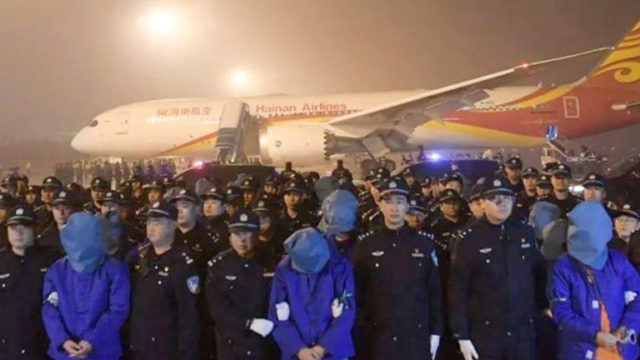
Assured that nearly 300 Chinese involved in cyber-crime against China had made more than 70 houses their haven, including some in Lalitpur, the Chinese authority did all that it had to do. Although tight-lipped even to Nepal Police till the day of the raid, the Chinese were all set for the raid that stunned the Nepali populace. Unfortunately, they missed the ‘mastermind’ and had to satisfy themselves with the ‘carriers’.
Early in the morning of December 23, 2019, Nepal’s Central Bureau of Investigation (CIB), Metropolitan Crime Division of Nepal Police and Metropolitan Police Circle Kathmandu mobilized a joint team for raids in various parts of Kathmandu. After raiding 9 houses in Balaju, Maharajgunj and Budhanilkantha, the Chinese security forces asked Nepal Police to halt the raid. By then, most of the key alleged of the cyber-crime had absconded.
China’s claim that the act of arresting the Chinese nationals was a ‘joint action against cybercrime’, while Nepal government’s indifference towards the investigation of the crime raises a serious question about the legitimacy of the whole process.
During his more than two weeks stay in Nepal’s capital, Kathmandu, Director Wang executed the activities ranging from tracking, raiding, presenting to the administration to releasing them in nominal fine and finally deporting them to China on the ground of entry permit only.
When he got all these things accomplished — some on his own and few via the Ministry of Home Affairs — Nepal Police merely assisted them. In fact, Nepal Police were kept in the dark in several instances as most of the information was gathered by the Chinese police themselves.
It was the Chinese security agents, not the Nepal Police, who seized and investigated all 747 mobiles, 331 laptops, 98 CPUs, 99 monitors, 22 pen drives and 327 SIM cards seized during the raids. When the Nepalese authorities proposed for a joint investigation, the Chinese side gave no space for Nepal in the investigation raising suspicion on the ability of Nepal Police.
In the raid executed by Wang, the main cybercrime-alleged Chen Sitian, Wu Rongfeng, Yu Waihai, Jhang Jhangmo, Chu Ching, Yang Dong, Xiao Chao all managed to flee. Sources said these masterminds managed to reach the Philippines a day prior to the raid twigging the ‘inefficiency’ of the Chinese monitoring on suspicious houses.
In contrary to Nepal Police’s commitment of conducting an investigation against the alleged, the act of presenting the alleged before the District Administration Office and releasing 34 of the 122 suspected criminals by paying a fine of Rs 2 thousand each and rest of the alleged in Rs 1 thousand each has made the case more complicated and suspicious.
Above it all, their deportation to China without any formalities generally carried out in such cases, has further mystified the case.
Former DIG Hemanta Malla, who has spent considerable time in crime investigation thinks skipping the investigation process might impact the credibility of the institution as well. “It’s the responsibility of Nepal Police to investigate such issues,” he asserts.
Although China has claimed that the alleged ones had managed to come to Nepal from Cambodia, Vietnam, Laos, Indonesia and Malaysia before the raid in Kathmandu, China is yet to produce any concrete evidence to justify its claim. Skipping the alternative procedures such as the cancellation of the passports and restriction on arrival or movement in the country, the direct deportation of the Chinese nationals further intricate the case.
Nepal Police did not bother to explore the issues like: How did the Chinese manage to run more than 21 software companies with more than 4 billion investment on it? Were they involved in any other crimes in Nepal or not? Did the seized materials have any evidence of their involvement in such activities or not? Where the money said to have been used in the illicit transaction of 100 to 150 million come from and where did it go never became the issue worth investigation for the police nor was it forwarded to the authority such as the Department of Money Laundering or Department of Revenue Investigation.
Neither did it bother to investigate to find out whether they were involved in any criminal activities in Nepal nor did it try to explore whether the seized items had any proof of their involvement in criminal activities.
Despite having enough ground for investigation, the police did not initiate the investigation under Chinese influence.
Former DIG Hemanta Malla, who has spent considerable time in crime investigation thinks skipping the investigation process might impact the credibility of the institution as well. “It’s the responsibility of Nepal Police to investigate such issues,” he asserts.
Although it is said that they used to have an illegal transaction worth 100-150 million, it was the duty of Nepali authority to find out both the source of origin and destination of the transaction.
However, neither the Department of Money Laundering nor the Department of Revenue Investigation were consulted on the issue. Even the Central Bureau of Investigation abstained from its responsibility. All this hints that the government was working under pressure on this issue.
Laxman Lal Karna, the chief whip of Rastriya Janata Party Nepal (RJPN) thinks such deportation executed by skipping the formal and due legal process stakes the state’s sovereignty. “Such suspicious deportation executed without due process of the law put the sovereignty at stake,” Karna argues.
Nepal, China inching toward signing extradition treaty targeting Tibetan refugees
The decision, as such, to deport the alleged of ‘serious cybercrime’ enacting a mock trial at the district administration which operates under the Ministry of Home Affairs, the changing of the allegation while presenting the alleged to the court, to complete the act from arrest to deport using only the mechanism under the Ministry of Home Affairs — Nepal Police, District Administration Office and Department of Immigration — all indicate a foul play in the incident.
China’s announcement to help Nepal Police during Home Minister Ram Bahadur Thapa’s China-visit, and the occurrence of the incident of the arrest and deport drama in Nepal make room for suspicions about China’s continuous reigning on the government.
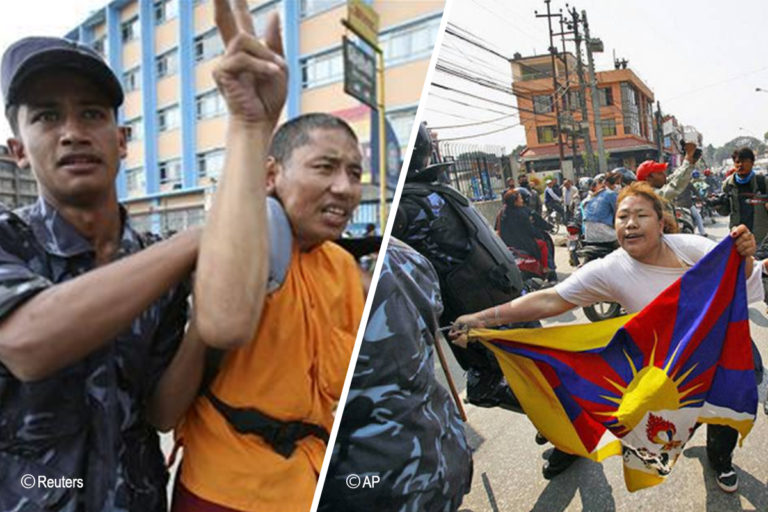
China’s claim that the act of arresting the Chinese nationals was a ‘joint action against cybercrime’ on the one hand and Nepal government’s indifference towards the investigation of the crime raises a serious question about the legitimacy of the whole process.
Senior advocate Dinesh Tripathi says the lack of transparency in the arrest and deportation of Chinese nationals has made a mockery of Nepal’s legal system itself. “The mysterious deportation of the Chinese is unusual and mysterious,” he says.
Likewise, strategic analyst Arun Subedi regards it as a preface to make room for extradition treaty. This deportation of more than a hundred alleged Chinese is an example of the Chinese influence and pressure on Nepal. “There is no place untouched by Chinese influence,” argues Subedi.
Extradition Treaty to snare the Tibetan refugees
China, for long, has been trying to persuade Nepal to sign the extradition treaty.
When China sent a draft of the Treaty on Mutual Legal Assistance in Criminal Matters in 2016, citing it contradicted with the Constitution and the Mutual Legal Assistance Act, 2014, Nepal’s Ministry of Law had refused to proceed ahead. Some of the provisions in the Chinese draft were designed to curb Tibetan refugees’ movement in Nepal and some of them contradicted Nepali laws.
Chinese draft held some provisions permitting the Chinese security agencies to come and investigate the Chinese arrested in Nepal.
Finally, amidst the pressure, Nepal turned out to be the first country to partner with China as per its Treaty on Mutual Legal Assistance in Criminal Matters. Nepal’s law says that while signing the extradition treaty with any country, Nepal should abide by the provisions in the Extradition Act, Mutual Legal Assistance Act and Organized Crime Control Act. However, the latest opaque deal with China has overlooked all these provisions.
Due to the lack of proper documents, many Tibetans born in Nepal are facing problems while traveling to the third country. The strict provisions requiring the Home Ministry’s consent for travel or meeting the family members has become a nuisance for Tibetans refugees.
The 9th point of the joint statement issued at the conclusion of Chinese President Xi Jinping’s two-day visit to Nepal in October 2019, which talks about the mutual legal assistance in criminal issues, is the continuation of the 10th point of the 14-point joint statement issued during Prime Minister K P Oli’s visit to China.
The latest deportation shows the provisions brought into effect after President Xi’s visit to Nepal.
Now the government has tendered the extradition treaty ahead. Citing the possibility of the disputes provided the treaty is signed with China alone, the government has planned to ink extradition treaty with both China and India together.
There have been a few inter-ministerial discussions on extradition. Senior officials of the Ministry of Home Affairs, Foreign Affairs, Law, Industry and Commerce, and Finance have discussed the impacts of the extradition treaty. However, Home Ministry sources claim that India’s indifference to it lately has put the plan to ink the deal with China in difficulties.
The extradition treaty proposed by China seems more focused on the Tibetan refugees; Nepal, however, seems a bit reluctant about it citing the sensitiveness of the issue.
Earlier, the Ministry of Home Affairs had made a draft committee under the chairmanship of the then Joint Secretary Ram Krishna Subedi. The committee had opined that the extradition treaty with China was not against the spirit of the Extradition Act 2014.
However, as it is still unclear whether such a treaty is needed, the committee suggested it would be judicious to consult the Ministry of Law, the Court, and the precedents prior to inking it. This shows that the officials at the Home Ministry are not clear on whether the extradition is really a priority to Nepal.
One of the reasons behind the cautious reaction of the senior officials is believed to be Nepal’s international commitment related to the Tibetan refugees here. Another concern could be about the possible Chinese reaction against the democratic movement or leaders in China.
Government officials have expressed their concern that Nepal’s involvement in such issues can blemish Nepal’s international status. Considering it all, the Ministry of Home Affairs had kept the treaty under the category ‘not feasible at the moment’.
When China’s attempt to make ‘more liberal’ the points in the proposed treaty failed to materialize, China seems to have adopted alternative ways of putting Nepal under pressure, though a bit differently, and make it go for the treaty.
The extradition treaty proposed by China seems more focused on the Tibetan refugees; Nepal, however, seems a bit reluctant about it citing the sensitiveness of the issue.
Human rights activists opine that Nepal-China Extradition Treaty if inked, impairs the life of thousands of Tibetan refugees in Nepal as China has been treating the Tibetans as criminals.
Nepal will be under further international pressure provided China started taking back the Tibetan refugees and other politicians under the extradition treaty.
Mounting pressure against Tibetan refugees
Although Nepal’s government has not changed its refugee policy, lately, in its attempt to entertain further support from China, the government of Nepal seems growing tougher towards the Tibetan refugees here. As a result, the asylum seekers are sent back informally.
The government does not have any lucid strategy on refugee management, yet under Chinese pressure, the government has been curbing the movements of the refugees and has also been quite vigilant against refugees.
Due to the lack of proper documents, many Tibetans born in Nepal are facing problems while traveling to the third country. The strict provisions requiring the Home Ministry’s consent for travel or meeting the family members has become a nuisance for Tibetans refugees.
Under the Chinese assistance, the Ministry of Home Affairs is working on maintaining the digitalized information about the refugees. According to the senior officials at the Ministry, the software installation is in the final phase. According to the sources, this software will be accessible to Nepal Police as well.
Nepal has given the refugee status only to those Tibetans who entered Nepal between 1959-1989 AD. No asylum seeker after that has got the Tibetan refugee’s status. There has been no Tibetan refugee census in Nepal after 1993. Then, their number was 13,514.
Despite being scattered in 21 districts, the Tibetan refugees are mostly living in 12 camps. However, Nepal Police data shows that there are 1,709 Tibetan refugees living in 13 camps in the valley.
Stating that several of them could be without formal documents, human rights workers say the number of Tibetan refugees would be over 20,000 in Nepal.
Due to the lack of proper documents, many Tibetans born in Nepal are facing problems while traveling to the third country. The strict provisions requiring the Home Ministry’s consent for travel or meeting the family members has become a nuisance for Tibetans refugees.
A group of Tibetan seeking asylum in Nepal was arrested in Humla on September 5 last year and were handcuffed prior to handing them over to China from Simikot. This was one of the latest activities which display China’s pressure in Nepal.
Criticizing the incident, eight US Congressmen, James P. McGovern, Christopher H. Smith (R-NJ), Eliot L. Engel, Michael T. McCaul, David Price, Steve Chabot, and Pramila Jayapal wrote to Arjun Karki, Nepal’s Ambassador to the USA and sought more clarification on the issue. In practice, Nepal Police seems to have adopted the policy of handing over the refugees to the police.
According to Senior Advocate Dinesh Tripathi, such activities violate Nepal’s ‘Gentleman’s agreement’ with UNHCR which advocates the refugee’s rights to travel to the third country.
The Tibetans who sought asylum as refugees in Nepal since Dalai Lama’s exile to India in 1959, never felt so much pressure in Nepal before.
Nepal has restricted the Tibetans from observing the birth anniversary of their religious leader the Dalai Lama. The movement of the Tibetans is sanctioned even on the basis of suspicion. At any time the refugees may be taken to custody.
With the growing Chinese interests in Nepal, the surveillance over the Tibetan refugee has been further intensified. The Tibetan refugees cannot make public comments on it, nor can they move freely. Chinese latest strategy in Nepal has curtailed the movements of Tibetans here.
The Tibetans were even restricted to walk or travel during Xi’s visit to Nepal. Chinese authorities had provided the list of some of the key Tibetans to the security forces of Nepal and special surveillance was maintained on them. Many Tibetans were held in police custody during Xi’s visit.
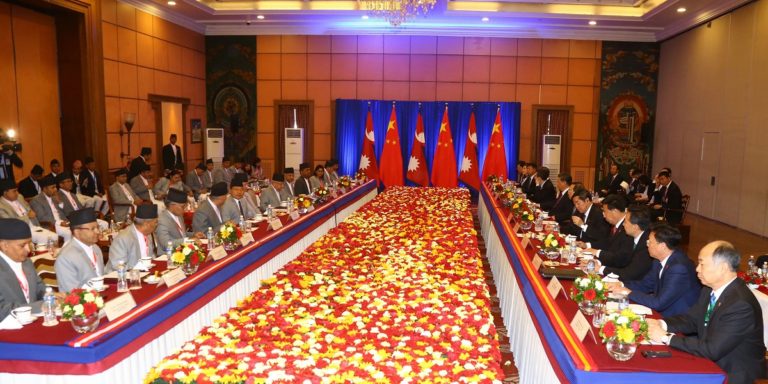
Human Rights Activist Charan Prasai interprets it as a sheer violation of fundamental rights related to freedom of expression and freedom of movement. He laments at the concerned authority’s inability to maintain a stance in such an issue.
Singha Durbar, too, not aloof from Chinese hassles
A Chinese company Chong E Richway Holdings based in Shanghai had forwarded a proposal to the Ministry for Finance for establishing an Infrastructure Development Bank in Nepal with a capital of Rs 100 billion mentioning its willingness to provide free shares worth Rs 20 billion to Nepal government.
Minister for Finance Dr Yubaraj Khatiwada, who is also an expert in the financial sector, reviewed the proposal on its long term impact, areas of investment, effective monitoring and the future of Nepal’s local banks, among other issues. He made it a point not to hasten to sign such an agreement that could create a long-term impact in Nepal’s banking sector.
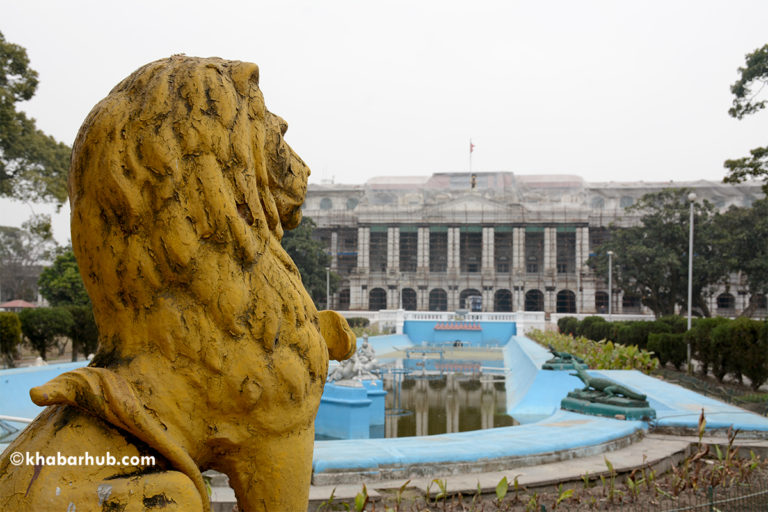
Likewise, representatives of other Chinese companies, too, initiated meetings with the Nepal Finance Minister Khatiwada with their unconvincing and ambiguous proposals for investment. As Minister Khatiwada dealt with them professionally, it eventually riled the Chinese.
Irate with the Finance Minister’s proficient dealings, local contractors of the Chinese companies then engaged in lobbying with the Nepali authorities, politicians, and even created propaganda in media against Minister Khatiwada to show him the door.
There are instances when Chinese Embassy officials, including the Chinese Ambassador approaching Nepal’s ministers with gifts, including a bottle of whiskey or some packets of green tea.
Realizing the fact that Minister Khatiwada would not be impressed with their hazy proposals, representatives of the Chinese companies, some restaurant operators, and other investors ‘suspended’ their meetings and taking pictures with the former with the belief that it would be a mere waste of time.
Khatiwada, also an expert in the banking sector, refused to budge under pressure and rejected signing any agreement with the Chinese companies giving a sense that the attempts by Chinese companies to impress Minister Khatiwada would be a mere failure.
Minister Khatiwada, during his tenure as a Governor, had reined in suspicious investments not bowing down before pressure and financial bait. He had also stopped companies from taking money abroad by not fulfilling due processes.
Chinese companies’ tendency of visiting Nepal’s Finance Ministers with gifts to allure them in their favor was brought to an end after Minister Khatiwada took charge of the Ministry of Finance.
Nepal’s ministers, of late, have limited their meetings with the Chinese contractors after the latter was found to be creating unnecessary hassles mainly at the Finance Ministry, Energy Ministry, Industry Ministry, Agriculture Ministry and Information Technology Ministry tempting the ministers and other authorities of financial and political benefits, visits and even shares in the Chinese companies.
There are instances when Chinese Embassy officials, including the Chinese Ambassador approaching Nepal’s ministers with gifts, including a bottle of whiskey or some packets of green tea.
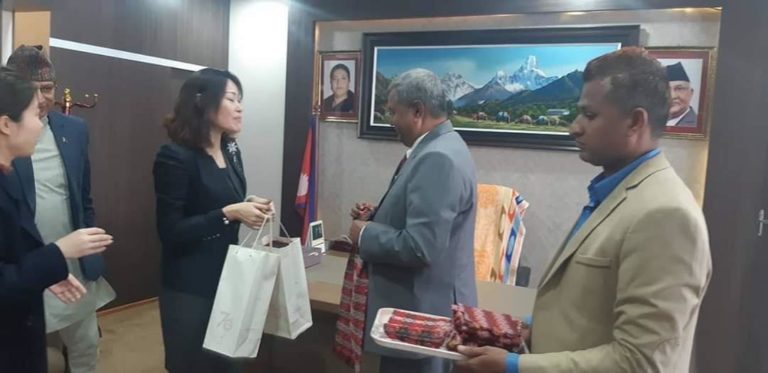
The Energy Ministry is no exception. If sources at the ministry are to be considered, tired of Chinese contractors’ presentations and proposals, the Secretariat at the Ministry of Energy even issued an instruction to prohibit Chinese contractors from meeting with the Minister. The Ministers have been meeting with those bearing a letter from the Ministry of Foreign Affairs.
Recently, a Cabinet minister ‘pushed’ a Chinese out of his ministry after he attempted to bribe the minister. The minister was flabbergasted to learn that an official from the Chinese Embassy in Kathmandu was also involved in the failed attempt to bribe him.
Nepal has been facing Chinese pressure in its domestic affairs with China’s growing impact in Nepal. Several agencies seem to be vulnerable with frequent Chinese pressures while high-ranking government officials have started maintaining a distance with the Chinese nationals of late.
Madhesh expert, Ganesh Kumar Mandal is of the view that all foreigners visiting Nepal must abide by Nepal’s laws and accept the country’s decision. He adds that the Chinese need to stop the diplomacy of pressure and influence in Nepal.
Pressure to release Chinese national involved in a hit-and-run
Deu Kumar Tamang, 38, of Machhapuchhre Rural Municipality-9 was hit by a jeep on a crosswalk while he was crossing a road at Amar Singh Chowk, Pokhara at 11 pm on July 2, 2019. The jeep, Ba 20 Cha 2566, knocking him down, fled the scene.
The pedestrian died on the spot. The person fleeing was Set Manager Chu Lang Feng, working with a Chinese company ‘Chinese CMC Engineering’ assigned for the construction of Pokhara Regional Airport.
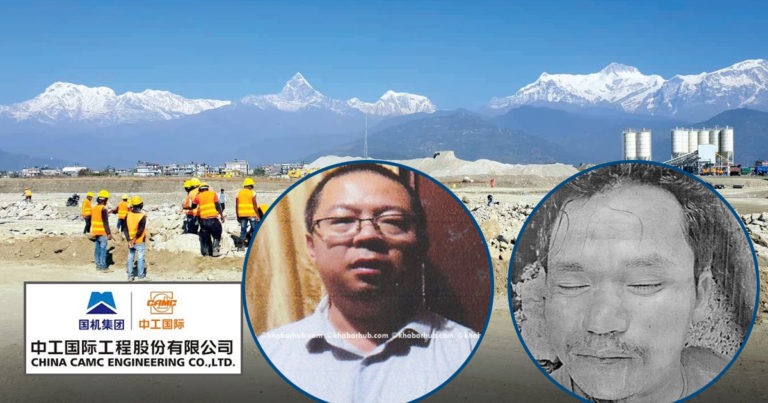
Police investigated the incident as the Chinese national was intoxicated and was driving sans a driving license. Unfortunately, local political leaders, businessmen, and high-ranking police officials made all possible attempts to get him released.
Chief of Kaski Police SP Dan Bahadur Karki submitted an investigation report to District Attorney Office. Amid pressure from several quarters, a case was filed against the Chinese national seeking a sentence as per the Sub Clause 2 of Clause 161 of Transport Management Act, 2049. But, the pressure to release him persisted for a long time.
Monopoly by controversial company Huawei in Nepal’s telecommunication sector
Controversial Chinese companies Huawei and ZTE have obtained tenders for almost all equipment for Nepal’s largest telecommunication service provider Nepal Telecom and Ncell. However, despite acquiring tenders, they have failed to stick to their commitments while increasing the committed amount. Huawei officials have been creating their monopoly by pressing and influencing high-ranking political leaders and administrative officials in Nepal.
Huawei, which was earlier fined for failing to work as per the agreement, got a tender worth Rs 32 billion from the government-owned Nepal Telecom for 4G expansion project. However, the works that it accomplished did not meet the required standards.
In 2012, Huawei had got a tender for the expansion of 4.8 million mobile lines as per the project of Nepal Telecom to expand 10 million mobile lines. After eight months, i.e, in February 2013, Huawei grabbed the project worth Rs three billion for expanding 5.2 million mobile lines.

As per the contract, the company was required to complete all works from installing, operating and repairing the equipment which means that it has ‘controlled’ Nepal Telecom for a longer period of time.
However, the company neither fulfilled its commitment within the stipulated time nor did it meet the required standards as per the agreement. Huawei’s business in Nepal, however, expanded with the growing Chinese influence in Nepal.
Now, a point to be considered with seriousness. Some high-ranking officials at Nepal Telecom have prepared its internal report concluding that Huawei has been involved in lengthening the project period, increasing the committed amount and carrying out substandard works after grabbing important tenders.
Despite this, the company got several other projects. Huawei, which has currently around 300 employees and technicians in Nepal, has completed the work for private companies on time but it has lengthened its project period, further increasing its committed amount for the government companies, which raises suspicion over its intent on Nepal Telecom.
Miffed by Huawei, Minister for Communications and Information Technology, Gokul Baskota had fined the Chinese company Rs 320 million as the company failed to initiate and accelerate its works as per the contract for a Nepal Telecom’s CDMA project. The company, which was awarded the contract to accomplish the work in eight years, however, didn’t start the job even six years after the deadline expiry.
Interestingly, the company which was fined for failing to meet the deadline obtained a tender for 4G expansion owing to its influence and pressure on the political and bureaucracy to grab the Rs 32 billion tender.
Sources say officials of the Chinese Embassy in Kathmandu were directly involved in some instances to grab the tender while Nepal Chief of Huawei tried to ‘expose’ his political influence on Nepali leaders saying that his relatives were among some of the high-ranking leaders of the Communist Party of China.
Nevertheless, Huawei succeeded in creating a monopoly in Nepal by all means. High-ranking officials of Huawei currently seem to be engaged in trying to ‘stop’ negative news of the company by providing advertisements, developing good relationships with the management and editors of influential media houses, and taking Nepali journalists to China on junkets, among others.
Huawei has recently appointed some editors of major newspapers as its advisors to ensure that no negative news is disseminated.
Similar pressure in other sectors
China’s Hongshi Company which has started producing cement in Nepal in collaboration with Nepal’s Shivam Cement has been found to be repeatedly flouting government standards.
The Nepal Bureau of Standards & Metrology has sought clarification from the cement factory several times for breaching the standards. But, the company has been found to be ‘threatening’ the Bureau alleging it of slandering the company’s reputation.
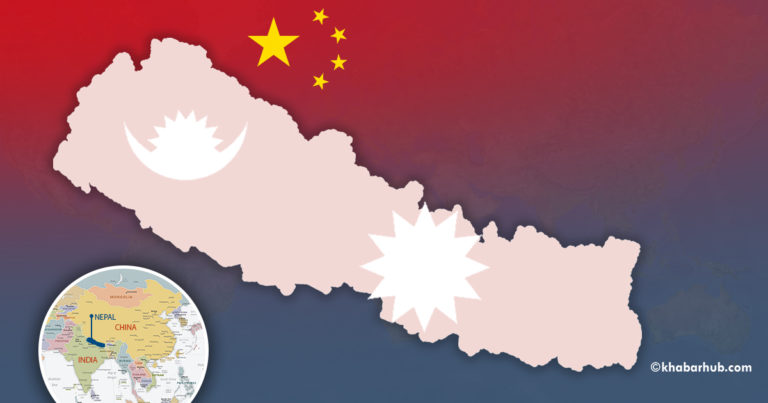
Currently, the company has taken a ‘strategy’ to publish advertisements in newspapers to put a cover on the 15-day clarification sought by the Bureau. Employees at the Bureau fear that raising concerns against the company as the Chinese Embassy has been ‘pressing’ them against pointing fingers at the company.
Another Chinese Company Huaxin Cement ‘captured’ a stream in Dhading for establishing a cement factory at an investment of Rs 15 billion. A parliamentary committee had directed to cancel the lease after it was found that government land was leased for a long period of time at a much lower rate.
Even though the cement factory has been closed, it has continued the exploitation of natural resources with the support from Nepali partner Suraj Vaidya and other political leaders by breaching the laws.
Be it solar or road construction projects in Nepal, the Chinese side has been working through its pressure and influence. As they have been using their own workers and resources, locals have failed to be benefited. There are instances of the Chinese Embassy creating pressure on government authorities, a government official revealed insisting anonymity.
Several people from different quarters of life have been taking China’s ‘increased pressure’ as lessons to be learned on how China behaves with its neighbors. Some say China could resort to micro-management in Nepal as its ambition will increase if Nepal fails to neglect Chinese growing pressure.
Government officials have been miffed as projects assisted by China have not been providing timely training to Nepalis employees and not informing them about the necessary process.
Meanwhile, officials at the Department of Railways have expressed dissatisfaction over the growing Chinese influence at the Department. It should be noted that several Nepalis were involved in a preliminary feasibility study of railway lines only to show it as a ‘joint effort’. Chinese companies, which are involved in the major portion of the feasibility study, are required to assist Nepal’s railway officials for enriching their skills, which, however, have not happened.
Chinese involvement in the minerals sector of Nepal, too, has been taken as suspicion as several Chinese companies have been registered in Nepal to work in the minerals-related sector. But, no progress has been made so far. Nepali officials are worried that the mineral sector, too, would meet the same fate as the hydropower.
Nepal’s high expectations from the Chinese investments have gradually dwindled as only Chinese workers are deployed in most of the projects. Besides, agreements made with the locals, too, are not fulfilled.
Moreover, Nepali officials have been irked as Chinese officials have been exerting pressure on them when the former seek clarification from Chinese nationals to clarify issues such as coming to them with wine bottles and exceeding the limit to not paying rents in Nepal.
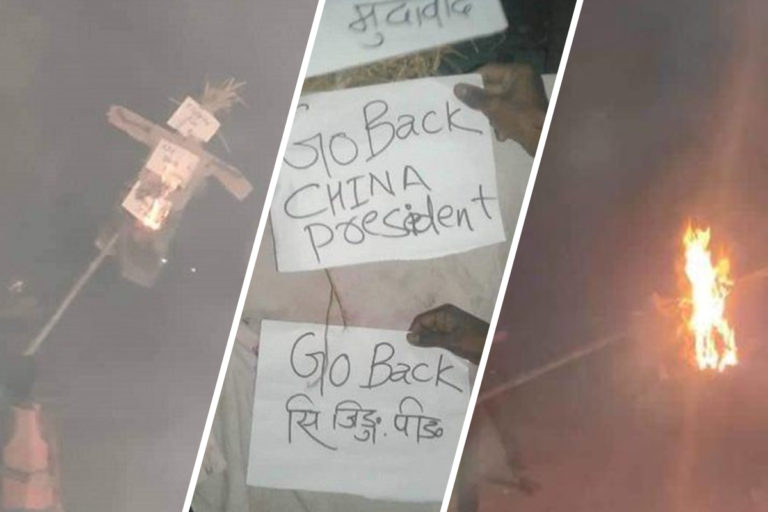
Government agencies have been undergoing hassles as the Chinese Embassy has been involved in petty stuff because of which there have been instances of growing anti-China sentiments in Nepal.
Several people from different quarters of life have been taking China’s ‘increased pressure’ as lessons to be learnt on how China behaves with its neighbors. Some say China could resort to micro-management in Nepal as its ambition will increase if Nepal fails to check China’s increasing pressure.
Analysts say as China is exerting pressure on Nepalis, seeking benefits of good faith will have a negative impact on Nepal. They believe that if China doesn’t make a course correction of behaviors it has been showing in Nepal and fails to be aware of the boundary of involvement, it is sure to pose a challenge to China itself.



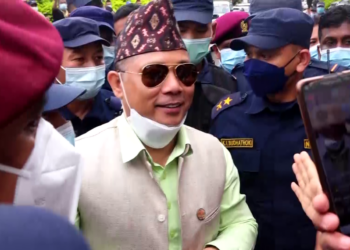





Comment